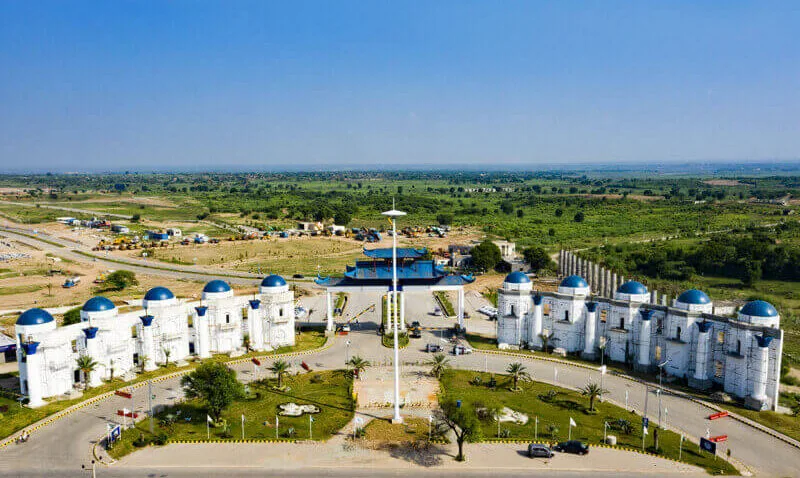Real estate is an important pillar of economic stability and prosperity in most regions of the world, and is known for its ability to provide relatively stable income and a good investment. Pakistan is no exception in this aspect as many other countries in the world where the real estate market was facing volatile swings due to COVID-19 issues as unemployment, low savings and reluctant relocation had further complicated the situation in the country.
However, similar to other structures in Estonia the sector has proved rather sustainable and is now one of the most broad based and fast growing industries of the country. In this blog, the writer talks about how the future is looking for the real estate business in Pakistan basing his arguments on the challenge, trends, and growth as well.
Pakistan’s Real Estate Market Landscape
There is a variety of agents that affect the Pakistan housing stock pricing and including consumer behavior and the market balance. There has been a population increase in this country hence increasing the demands for the homes thus appreciation of the real estate market accompanied by a shortage of affordable homes. But to these challenges, they have been made worse by this inflation because the construction costs are now high and owning property is not easily achievable by anyone. Therefore the trend of renting and subletting is increasing due to flexibility and coping up with forces in the economy.
Key Predictions for Pakistan’s Real Estate Market

Given these challenges and trends, here are eight predictions for the future of Pakistan’s real estate market:Given these challenges and trends, here are eight predictions for the future of Pakistan’s real estate market:
- Residential Real Estate is Not a Priority: With the emergence of the pandemic, there has been increased inflation and many people including employment have been affected hence the poor uptake of the residential properties. Despite this, many people are more concerned with trying to get back their lost money, which can take a long time and may serve to slow down the movement into real estate investments.
- Market Appreciation: Thus, corresponding to scarcity, utility, and demand, the real estate market of Pakistan can only go up even in the worst of the economic recession. These factors include the large housing deficit, growing telework curtains, and a youth that demands its own accommodation.
- Increased Demand for Family Homes: A large number of people still prefer to live in a multi-family living arrangement because of the cultural values that favor this as a norm. As indicated before, more than 60% of these households have three or more individuals residing in them; therefore, such buildings will probably have more traffic and higher charges.
- Unaffordable Housing Prices: It also revealed the fact that there is a lack of development of affordable housing units. This is due to the high levels of urbanization and lower supply hence the relatively low supply of houses by actual sales results which make it hard for an average Pakistani to own a house.
- Market Fluctuations Due to Mortgage Rates: Increment in the interest rates of mortgages and ill-coordinated records of ownership of land may be perceived as a problem for individuals who are soon to be homeowners. Based on these rates’ outcomes, it is possible that the market will slow down if the rates are elevated or invest more in the market if the rates are increased.
- Technological Integration: E-enablement impact on Pakistan real estate. They are gradually shifting to online sales of properties from real estate where marketing tools such as virtual reality and artificial intelligence are also improving the sales and management of properties.
- Growth in Sublease Space: There has been a change witnessed in recent years where employees have been working from home, thus minimizing the need for large office buildings that were usually rented by many organizations, hence creating a market for subleasing by those who subscribed to such commercial buildings. It is probable that these trends will remain steady for the future as more companies strive for cost efficiency.
- Expansion of the Rental Market: Rising property prices have made renting a more attractive option for many. Currently, about 25% of Pakistanis live in rented accommodations, and this number is expected to grow as affordability issues persist.
Challenges Facing the Real Estate Sector
The real estate industry in Pakistan faces several critical challenges:
- Lack of Planning: Inadequate urban planning has led to inefficient use of land and resources.
- Regulatory Deficiencies: The absence of robust regulatory frameworks has allowed malpractices to flourish, deterring potential investors.
- Fraudulent Practices: Fraud remains a significant issue, with many transactions lacking transparency and security.
Opportunities for Growth

Despite these challenges, there are numerous opportunities for growth in Pakistan’s real estate sector:
- Government Initiatives: Programs like the Naya Pakistan Housing Program aim to address the housing shortage by promoting affordable housing projects.
- Technological Advancements: Embracing technology can streamline operations, enhance transparency, and attract a broader investor base.
- Investment Potential: With increasing urbanization and population growth, the demand for residential and commercial properties is likely to rise, offering substantial returns for investors.
Conclusion
The future of Pakistan’s real estate market is dynamic and multifaceted. While challenges such as inflation, regulatory gaps, and affordability persist, the sector also presents significant opportunities for growth and investment. By addressing these issues through better planning, regulation, and technological integration, Pakistan can harness the potential of its real estate market to drive economic development and improve living standards.
Investors should stay informed about market trends and government policies to make strategic decisions. As Pakistan continues to evolve, its real estate market holds the promise of substantial growth and transformation.
FAQs
1. Why is the real estate market in Pakistan currently challenging?
There are various factors that have affected the real estate market in Pakistan that includes high inflation, lack of proper urban planning, and regulation as well as fraudulent real estate dealers. Further, with the COVID-19 pandemic, the situation has worsened as the unemployment rate has gone up and savings have lowered.
2. What factors are driving the appreciation of the real estate market in Pakistan?
The market is expected to appreciate from aspects such as; It has been observed that the supply of residential properties is scarce, work from home and the hybrid model is the new normal which will require home offices, and the population comprises the youth who are in the prime of their lives and thus will seek shelter.
3. Why is buying residential property not a priority for many Pakistanis right now?
The final conclusion also reflects the fact that due to the COVID19 pandemic and inflation, people's liquidity depleted, they are interested in saving and recovering, which is not associated with buying real estate.
Real estate is an important pillar of economic stability and prosperity in most regions of the world, and is known for its ability to provide relatively stable income and a good investment. Pakistan is no exception in this aspect as many other countries in the world where the real estate market was facing volatile swings due to COVID-19 issues as unemployment, low savings and reluctant relocation had further complicated the situation in the country.
However, similar to other structures in Estonia the sector has proved rather sustainable and is now one of the most broad based and fast growing industries of the country. In this blog, the writer talks about how the future is looking for the real estate business in Pakistan basing his arguments on the challenge, trends, and growth as well.
Pakistan’s Real Estate Market Landscape
There is a variety of agents that affect the Pakistan housing stock pricing and including consumer behavior and the market balance. There has been a population increase in this country hence increasing the demands for the homes thus appreciation of the real estate market accompanied by a shortage of affordable homes. But to these challenges, they have been made worse by this inflation because the construction costs are now high and owning property is not easily achievable by anyone. Therefore the trend of renting and subletting is increasing due to flexibility and coping up with forces in the economy.
Key Predictions for Pakistan’s Real Estate Market

Given these challenges and trends, here are eight predictions for the future of Pakistan’s real estate market:Given these challenges and trends, here are eight predictions for the future of Pakistan’s real estate market:
- Residential Real Estate is Not a Priority: With the emergence of the pandemic, there has been increased inflation and many people including employment have been affected hence the poor uptake of the residential properties. Despite this, many people are more concerned with trying to get back their lost money, which can take a long time and may serve to slow down the movement into real estate investments.
- Market Appreciation: Thus, corresponding to scarcity, utility, and demand, the real estate market of Pakistan can only go up even in the worst of the economic recession. These factors include the large housing deficit, growing telework curtains, and a youth that demands its own accommodation.
- Increased Demand for Family Homes: A large number of people still prefer to live in a multi-family living arrangement because of the cultural values that favor this as a norm. As indicated before, more than 60% of these households have three or more individuals residing in them; therefore, such buildings will probably have more traffic and higher charges.
- Unaffordable Housing Prices: It also revealed the fact that there is a lack of development of affordable housing units. This is due to the high levels of urbanization and lower supply hence the relatively low supply of houses by actual sales results which make it hard for an average Pakistani to own a house.
- Market Fluctuations Due to Mortgage Rates: Increment in the interest rates of mortgages and ill-coordinated records of ownership of land may be perceived as a problem for individuals who are soon to be homeowners. Based on these rates’ outcomes, it is possible that the market will slow down if the rates are elevated or invest more in the market if the rates are increased.
- Technological Integration: E-enablement impact on Pakistan real estate. They are gradually shifting to online sales of properties from real estate where marketing tools such as virtual reality and artificial intelligence are also improving the sales and management of properties.
- Growth in Sublease Space: There has been a change witnessed in recent years where employees have been working from home, thus minimizing the need for large office buildings that were usually rented by many organizations, hence creating a market for subleasing by those who subscribed to such commercial buildings. It is probable that these trends will remain steady for the future as more companies strive for cost efficiency.
- Expansion of the Rental Market: Rising property prices have made renting a more attractive option for many. Currently, about 25% of Pakistanis live in rented accommodations, and this number is expected to grow as affordability issues persist.
Challenges Facing the Real Estate Sector
The real estate industry in Pakistan faces several critical challenges:
- Lack of Planning: Inadequate urban planning has led to inefficient use of land and resources.
- Regulatory Deficiencies: The absence of robust regulatory frameworks has allowed malpractices to flourish, deterring potential investors.
- Fraudulent Practices: Fraud remains a significant issue, with many transactions lacking transparency and security.
Opportunities for Growth

Despite these challenges, there are numerous opportunities for growth in Pakistan’s real estate sector:
- Government Initiatives: Programs like the Naya Pakistan Housing Program aim to address the housing shortage by promoting affordable housing projects.
- Technological Advancements: Embracing technology can streamline operations, enhance transparency, and attract a broader investor base.
- Investment Potential: With increasing urbanization and population growth, the demand for residential and commercial properties is likely to rise, offering substantial returns for investors.
Conclusion
The future of Pakistan’s real estate market is dynamic and multifaceted. While challenges such as inflation, regulatory gaps, and affordability persist, the sector also presents significant opportunities for growth and investment. By addressing these issues through better planning, regulation, and technological integration, Pakistan can harness the potential of its real estate market to drive economic development and improve living standards.
Investors should stay informed about market trends and government policies to make strategic decisions. As Pakistan continues to evolve, its real estate market holds the promise of substantial growth and transformation.
FAQs
1. Why is the real estate market in Pakistan currently challenging?
There are various factors that have affected the real estate market in Pakistan that includes high inflation, lack of proper urban planning, and regulation as well as fraudulent real estate dealers. Further, with the COVID-19 pandemic, the situation has worsened as the unemployment rate has gone up and savings have lowered.
2. What factors are driving the appreciation of the real estate market in Pakistan?
The market is expected to appreciate from aspects such as; It has been observed that the supply of residential properties is scarce, work from home and the hybrid model is the new normal which will require home offices, and the population comprises the youth who are in the prime of their lives and thus will seek shelter.
3. Why is buying residential property not a priority for many Pakistanis right now?
The final conclusion also reflects the fact that due to the COVID19 pandemic and inflation, people's liquidity depleted, they are interested in saving and recovering, which is not associated with buying real estate.
Get A Free Expert Advice – Reach Out to Us
Get A Free Expert Advice – Reach Out to Us
Call us today at (+92)-51-2120900
Call us today at (+92)-51-2120900




